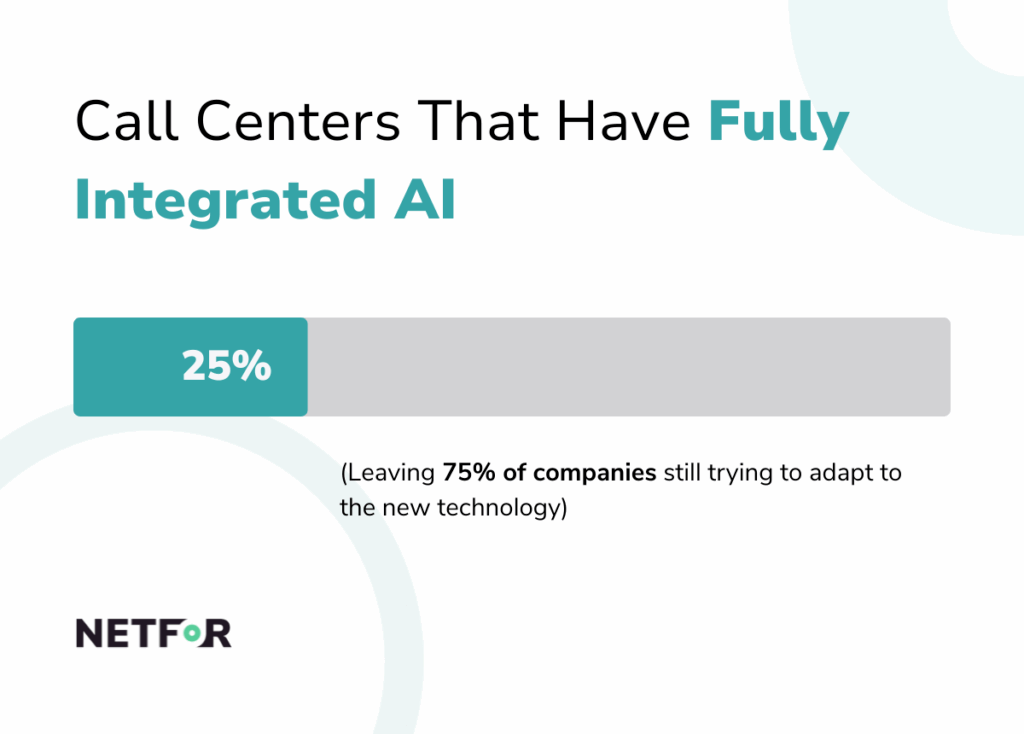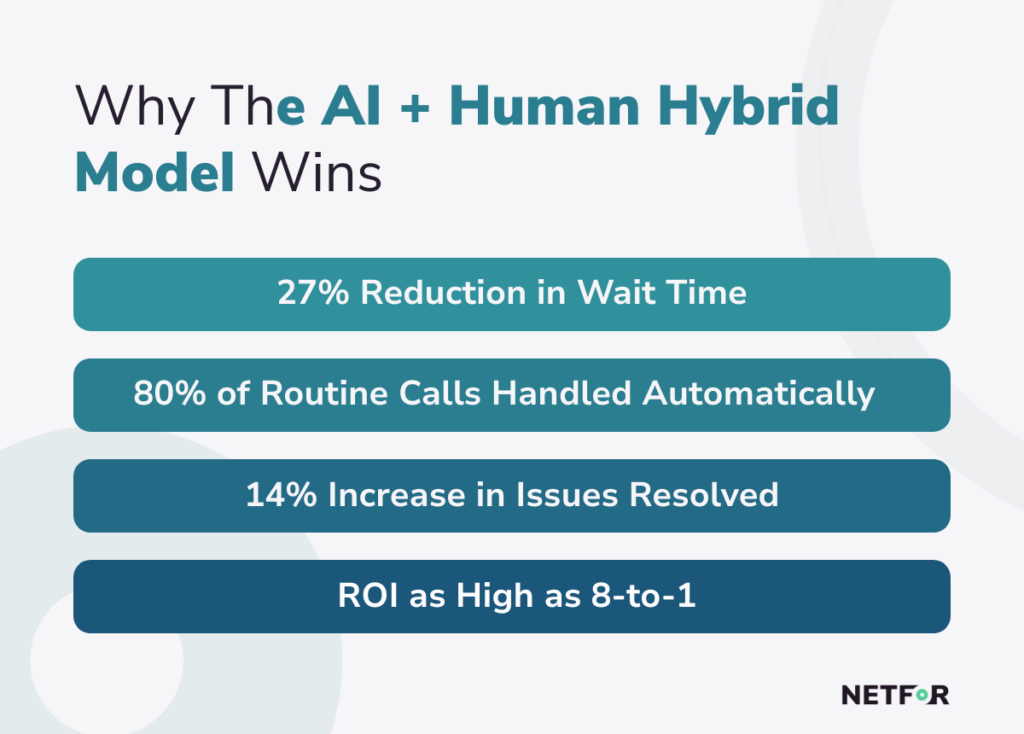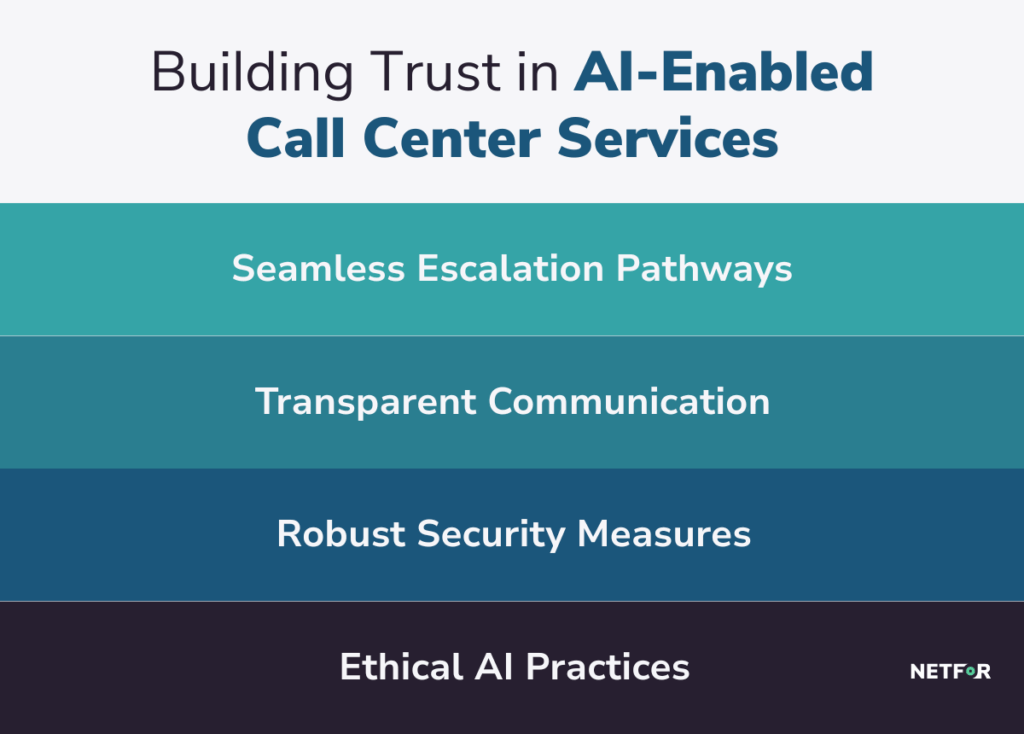AI customer service is no longer a futuristic concept. It’s reshaping call center services right now, fundamentally changing how businesses interact with their customers. The technology has matured from basic chatbots to sophisticated systems that can analyze sentiment, predict customer needs, and provide real-time guidance to human agents.
Yet despite this technological advancement, a significant challenge remains: Trust. Customers demand the speed and 24/7 availability that AI provides, but they also insist on the empathy and understanding that only human agents can deliver. This creates a paradox that businesses must solve to succeed in the modern customer service landscape.
The answer isn’t choosing between AI or human support. The most successful organizations are combining them in a hybrid model that delivers both efficiency and empathy. This approach acknowledges that different customer needs require different solutions, and the key to exceptional service lies in deploying the right resource for each situation.
The Market Shift Toward AI in Customer Service
AI customer service refers to the use of artificial intelligence technologies to automate, enhance, and optimize customer support interactions. This includes chatbots, virtual assistants, intelligent ticket routing, and agent-assist tools that help human representatives provide better service.
An AI call center integrates these technologies into traditional call center operations, using AI to handle routine inquiries, route calls intelligently, and provide real-time support to agents during customer interactions.
The numbers behind this transformation are staggering:
- The global AI customer service market is projected to grow from $12.06 billion in 2024 to $47.82 billion by 2030. This represents a compound annual growth rate of 25.8%.
- The call center AI market specifically will expand from $1.99 billion to $7.08 billion over the same period.
- North American businesses alone are expected to invest $14.91 billion in AI customer service by 2030.
Despite this explosive growth in investment, only 25% of call centers have fully integrated AI into their operations. This leaves 75% of the market as untapped opportunity for businesses ready to embrace customer service technology that can deliver competitive advantages.

The adoption gap exists despite strong executive intent. Seventy percent of C-level support executives report plans to invest in AI, and 83% of companies identify AI as a top business priority. However, implementation challenges persist, including poor data quality, skills gaps, and lack of clear strategic roadmaps.
This is where the right BPO partner makes the difference. Businesses often want the benefits of AI-enabled call centers but struggle to execute. Providers like Netfor help bridge that gap by combining AI technology with operational expertise, training, and governance practices that accelerate adoption and reduce risk.
The Trust Gap: What Customers Really Want
Understanding customer attitudes toward AI in customer support reveals a complex paradox. While customers appreciate AI’s speed and availability, they maintain strong preferences for human interaction in many situations.
The data paints a clear picture of customer sentiment:
- 93.4% of consumers prefer interacting with humans for customer service. (Source)
- 86% believe empathy and human connection matter more than speed. (Source)
- 62% prefer chatbots for simple, straightforward requests.
- 74% specifically want chatbots for quick questions that don’t require complex problem-solving.
This isn’t contradictory behavior. Customers make situational choices based on their needs. For simple transactions like checking account balances or tracking orders, AI provides the immediate answers they want. For complex issues involving emotions, high stakes, or nuanced problem-solving, human agents remain essential.
The risks of AI-only approaches become apparent when these customer preferences are ignored:
- Lack of empathy: Customers facing stressful situations need understanding and reassurance that AI cannot provide.
- Misinterpretation: AI systems can struggle with context, regional language variations, or complex queries.
- Escalation dead-ends: When AI fails to resolve issues, customers feel trapped without access to human help.
- Privacy concerns: Trust in businesses using AI ethically dropped from 58% in 2023 to just 42% in 2024.
These challenges underscore the need for a hybrid customer service model that combines AI efficiency with human empathy, ensuring customers receive appropriate support for their specific situations. Businesses that fail to recognize this reality risk alienating customers, eroding brand trust, and losing loyalty in highly competitive markets.
The Hybrid Model in Action: Human + AI Collaboration
The most effective digital customer service operations divide labor strategically between AI and human agents, leveraging each resource’s strengths while compensating for their limitations.
AI handles:
- Frequently asked questions and basic troubleshooting.
- Intelligent ticket routing to appropriate agents.
- Real-time knowledge base searches and information retrieval.
- Sentiment analysis and behavioral coaching for agents.
- Initial customer interactions and qualification.
Humans handle:
- Complex technical issues requiring creative problem-solving.
- Emotional situations demanding empathy and reassurance.
- Relationship building and customer retention efforts.
- Escalated cases where AI has reached its limits.
- Experience orchestration and quality assurance.
Netfor’s proprietary Real-Time Interaction Guidance (RTIG) technology exemplifies this collaborative approach. The system actively monitors live interactions, providing agents with:
- Sentiment analysis that alerts agents to customer frustration or satisfaction levels.
- Keyword triggering that surfaces relevant knowledge articles when specific issues are mentioned.
- Real-time coaching that reinforces best practices during actual customer conversations.
The results speak for themselves:
- 92% First Call Resolution rate compared to the 80% industry benchmark.
- 97% of calls answered in under 20 seconds.
- Ticket deflection rates up to 35% through enhanced self-service.
One case study demonstrates the power of this approach. Netfor helped a global retailer improve their First Call Resolution from 63.9% to 81.9% in just six months, directly impacting customer satisfaction and operational efficiency.
These results prove that the hybrid model is not just a concept, it’s a working strategy delivering real business outcomes.
The Business Case: Why Hybrid Models Win
AI support solutions deliver measurable improvements across multiple business metrics, creating compelling ROI for organizations willing to invest in the technology.
Efficiency gains include:
- 14% increase in issues resolved per hour for AI-assisted agents.
- 27% reduction in Average Handle Time through intelligent agent support.
- Up to 80% of routine inquiries handled automatically by AI systems.
- 2 hours and 20 minutes saved per day for customer service specialists using AI tools.
Cost impact is substantial:
- 30% to 85% reduction in overall support costs.
- Average ROI of $3.50 for every $1 invested in AI customer service.
- Leading organizations achieve ROI as high as 8-to-1.
- Klarna’s AI assistant handles work equivalent to 700 full-time agents, contributing to $40 million in projected profit improvement.
The hybrid approach delivers dual benefits that pure AI or human-only models cannot match. Customer service automation handles high-volume, routine tasks cost-effectively, while human agents focus on high-value interactions that build customer loyalty and drive revenue.
Customer satisfaction scores improve by 12% on average with AI implementation, and when AI enables personalized service by human agents, satisfaction gains can reach 27%. This demonstrates that technology enhances rather than diminishes the human element of customer service.
For decision-makers, this isn’t simply about saving costs, it’s about transforming the support function into a value generator. By combining AI efficiency with human empathy, organizations protect margins, strengthen brand loyalty, and unlock capacity for growth.

Building Trust in AI-Enabled Call Center Services
Trust remains the critical factor determining success in AI call center implementations. Organizations must address customer concerns proactively to achieve widespread acceptance.
Key trust-building strategies include:
- Seamless escalation pathways: 88.8% of customers expect the option to speak with a human agent when needed.
- Transparent communication: Clearly inform customers when they’re interacting with AI and explain how their data is used.
- Robust security measures: Implement comprehensive data protection following GDPR, CCPA, and industry-specific regulations.
- Ethical AI practices: Ensure customer data isn’t used for model training without explicit consent.
Virtual customer service implementations succeed when they prioritize customer choice and control. The most trusted systems offer multiple interaction channels and allow customers to move between AI and human support based on their preferences and needs.
Organizations should also invest in agent training to ensure smooth handoffs between AI and human support. When customers escalate from AI chatbot support to human agents, the transition should feel natural and informed, with agents having full context of previous interactions.
Regular audits of AI performance help identify bias, accuracy issues, and areas where customer trust might be eroding. Proactive monitoring and continuous improvement demonstrate commitment to responsible AI deployment.
For businesses, this means trust isn’t just a “soft factor”, it’s a measurable driver of customer loyalty. Companies that successfully address trust concerns will see adoption rise, satisfaction scores improve, and long-term ROI realized.

The Future of AI in Customer Support
The evolution of AI for business support points toward increasingly sophisticated and proactive service models that will reshape customer expectations and business operations.
Emerging trends include:
- Hyper-personalization: 70% of customer experience executives believe AI will enable highly personalized customer journeys at scale.
- Predictive support: AI will identify potential issues before customers experience them, enabling proactive outreach and resolution.
- Advanced conversational AI: 56% of consumers expect bots to hold natural conversations by 2026.
- Omnichannel intelligence: AI will maintain unified customer context across all interaction channels.
The changing role of human agents: Human customer service representatives are evolving into “experience orchestrators” who manage complex customer journeys with AI as their co-pilot. This transformation requires new skills including data interpretation, emotional intelligence, and technology management.
AI in customer experience will also become a key differentiator in BPO selection decisions. By 2025, Business Process Outsourcing providers that successfully integrate AI could see performance improvements exceeding 30%. The competitive advantage will belong to organizations that master human-AI collaboration rather than those simply deploying AI tools.
AI in BPO services will shift from labor cost arbitrage to technology access and expertise. Businesses will choose partners based on their ability to deliver superior outcomes through sophisticated AI platforms operated by skilled human talent.
Mastering the Balance: AI-Powered Efficiency Meets Human-Centered Trust
The future of customer service doesn’t require choosing between artificial intelligence and human agents. Success lies in thoughtfully combining these resources to create experiences that are both efficient and empathetic.
The data demonstrates that hybrid models outperform AI-only approaches across virtually every meaningful metric. Customers receive faster initial responses through AI while maintaining access to human empathy when they need it most. Businesses achieve significant cost savings and efficiency gains while improving customer satisfaction scores.
Netfor’s proven approach exemplifies this balance. Through Real-Time Interaction Guidance technology and strategic human-AI collaboration, the company delivers 92% First Call Resolution rates and answers 97% of calls in under 20 seconds. These results exceed industry benchmarks because they leverage AI’s strengths while preserving the human elements that customers value most.
Organizations ready to modernize their customer service operations should focus on building trust through transparency, maintaining human escalation pathways, and implementing robust security measures. The goal isn’t to replace human judgment with artificial intelligence, but to enhance human capabilities with intelligent tools.
For businesses seeking a trusted partner to navigate this transformation, Netfor is ready to help. Our proven approach to human and AI collaboration shows how technology can amplify human service rather than replace it. With solutions like RTIG and industry-leading inbound call center performance, we make customer support faster, smarter, and more empathetic. Contact us today to learn how Netfor can help you modernize your customer service strategy.

